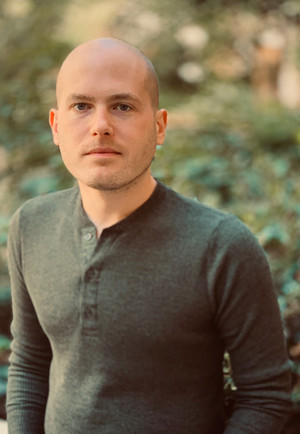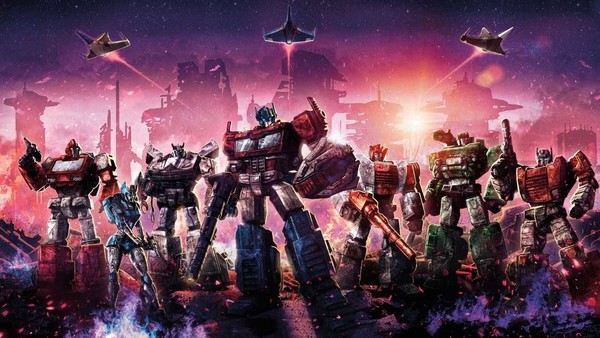Creating the Sci-Fi Sounds of Transformers: War for Cybertron Trilogy: Siege with Composer Alexander Bornstein
by Lynzee Loveridge, The next installment in Hasbro's decades-spanning sci-fi franchise Transformers finds its home on Netflix on Thursday as Transformers: War for Cybertron Trilogy: Siege. The six-episode 3DCG-animated series by Polygon Pictures takes a look at what happened to Optimus Prime, the Autobots, and the Decepticons that led to their flight from Cybertron. The creative team includes composer Alexander Bornstein, the musical mind behind sci-fi works such as Love, Death & Robots, Stephen Hopkins' Lost in Space, and Agent Carter.
The next installment in Hasbro's decades-spanning sci-fi franchise Transformers finds its home on Netflix on Thursday as Transformers: War for Cybertron Trilogy: Siege. The six-episode 3DCG-animated series by Polygon Pictures takes a look at what happened to Optimus Prime, the Autobots, and the Decepticons that led to their flight from Cybertron. The creative team includes composer Alexander Bornstein, the musical mind behind sci-fi works such as Love, Death & Robots, Stephen Hopkins' Lost in Space, and Agent Carter.
Bornstein sat down with Anime News Network to give an inside look into how he creates his sci-fi-infused scores, his history with the popular franchise, and what to expect from the series.
I thought we could start with a little background. Do you have a history with the Transformers franchise, either the films, animated series, or toys?
When I was in first grade, that was about 92-93, it was right when Syfy launched and part of their morning programming block was Transformers G-1 [first generation]. That was my first exposure. It was so cool, it was robots that turned into cars and it was easy to get pulled into that lore and mythology! Beasts Wars, too. I really got into the Optimus Prime/Megatron dynamic and in G1, that was really cool. I got into Beast Wars but not as much as G1. I saw the movies when they came out, the first one especially to see Peter [Cullen] come back as Optimus Prime to reignite interest in the franchise. It had a background presence for me growing up. To be on the new Netflix series for Transformers is really cool. A lot of pressure but it's really exciting.
Let's put this one to rest. Autobots or Decepticons?
I feel like I have to say Autobots because ...especially when the series come out and people see. There's definitely some cool Decepticons but I think Autobots, for sure. It's funny, I think coming out of this series I have a newfound appreciation for Wheeljack and Ratchet. He's really good, especially in Siege, but what it comes down to is I really enjoy what Wheeljack brings to the Autobots. He's an engineer and a bit of a wise guy but it all kinda works.
Can you discuss some of your early professional projects? How has your process changed over time?
When I was starting out composing I used to only write on pencil and paper. I was not much of a tech person. The benefit of that is from school I got a lot of tech knowledge as far as music theory. When I finished grad school and moved into Los Angeles I got more into tech as I started as an intern and then a full blown assistant. I've been in L.A. for nine years and that's been the biggest shift of my workflow and in the last six or seven years I've been exclusively computer-based as far as composing. I really embraced all the tech in theory, got really into synth a few years ago when I didn't care for it before. I had a whole explosion of enthusiasm for them. Creatively that's been the shift for me, DAWs [Digital Audio Workstation], and sequences and whatever latest tech I can get a hold of.
What's your set-up?
I have like four computers in tandem for writing.
From a composition standpoint, you have a lot of experience creating music for reboots like the new Twilight Zone and Lost in Space. Do you listen to the pre-existing soundtracks before creating a score for these works or go in completely fresh?
I tend to go in fairly fresh. The reboot projects are where I was functioning as an additional composer and in those environments I'm working for another composer and they tend to dictate the parameters. With Lost in Space I worked for Christopher Lennertz and he was specific about using the season three John Williams theme when appropriate. I just made sure I understood the thematic materials.
It was the opposite for Marco Beltrami and Brandon Roberts on Twilight Zone and that was a completely fresh approach. There it was even more accentuated because it's a different story and environment, so it's going in with as fresh of a lense as possible. With Transformers it's more like that approach than what I did on Lost in Space. Since there hasn't been a Transformers [series] with the tone of Seige we went with a different approach when looking at the past scores of Robert J. Walsh, Johnny Douglas, and Vince DiCola.
What kind of creative freedom are you given and how much direction do other project members give you, i.e. director?
I have been lucky on Transformers where I'm stuck in this great middle ground. I'm given clear direction from the director but I also get to take some creative swings at things and he's stepped back and let me do my thing. This project is a really nice balance of having clear ideas from collaborators but having a lot of room to try things as well. Sometimes it sticks and sometimes it doesn't, but it's a really nice balance of experimentation and direction. It's helped me establish some thematic content for the show and a distinct sound that will resonate with the audience.
As a seasoned composer for sci-fi series, are there particular sounds you like to use to invoke that “otherwordly” feel?
It depends on each individual project. That's something I really embrace as I go further down the sci-fi rabbit hole and really challenging that encyclopedic database you build in your brain, like french horns for heroic moments and odd synths and string clusters for "otherworldly". I like to change that as much as possible. Sometimes the classics work, but I've found that really getting into sound design and processing sound with synthesizers that can push those limits of "something I've never heard before."
Jóhann Jóhannsson, like what he did in Arrival where you here those processed organic sounds repurposed in a way that's juxtaposed with visuals that really turn your brain upside down. That's what I try to do on these kind of projects that challenge what you expect from sci-fi. It's one of the bigger challenges on any given project, whether sci-fi or not. "How do you come up with sound and music content that is really going to resonate with people and not feel cliche?" That's the dagger in my heart when it's supposed to be weird and I feel like I'm relying on the usual sounds. You do want to make sure you're always challenging yourself.

Transformers as a sci-fi series is an interesting merger between “alien” and “robot,” how did you capture the sound behind a place like Cyberton for the Netflix series?
FJ [DeSanto] and I worked together and decided on the broad stokes. We want to show how massive it is and he did a lot of describing what it is as a planet. I wanted to rely on synths again but also use them, in terms borrowed from synthwave elements, as arpeggios and baselines. I used a lot more pad textures like what you'd hear in Blade Runner which I feel really conveyed the size and scope of this alien world.
By fusing those two things together, I was hoping to build this atmosphere. The planet has a very distinct theme in the show that symbolizes it and some...spoilers I can't get into. That seemed to work well because it created this light sense of adventure with the arpeggios, baselines, pad textures, and big flowing sounds. You get the alien scope added to it. It was an interesting mix that didn't rely on orchestra as much. Orchestra was saved for more of the emotional moments and action-heavy scenes.
When putting together the composition, how much of the series were you able to see in advance? Given the current state with COVID-19 and the animation coming out of Japan, it sounds like things could have gotten complicated.
We wrapped on Seige in February 2020 so we were able to get through without being affected by the pandemic. Some sequence chapters were slowed down, but typically what we've done is I would spot with FJ two episodes at a time and come up with the blueprint. Usually the way it worked out is that after I finished the second episode the next one was ready to go. I composed the score to the animatics, but the timing would be finished for the most part. It was cool because when I'd get the updated animation it was like seeing a new coat of paint on what I saw before. It's like you're seeing different elements come together at different times until it's finally revealed. The score is written first, so I feel like I'm like the first one to the party.
Who are your favorite contemporary film composers and who are your favorite composers of all time?
Of composers currently working, I'm a big fan of Jóhann Jóhannsson. He was a really big inspiration. He was always innovating the sound whe was working on and challenging himself on all his work. Also, Terence Blanchard did a score for a movie called 25th Hour and the first time I ever heard it it blew me away. He's still composing to this day. Just has a very distinct sound.
I'd also say there's a tie between him and Junkie XL. Mad Max Fury Road had such a good score I can never match that. John Powell is the other who I really like. He writes these really grand sweeping scores that sound contemporary. He relies on a lot of great nostalgia elements but it still sounds fresh and exciting.
Are there any big moments from the series that you're excited for fans to see?
There's a lot of back and forth conversations between Autobots and Decepticons. There's some really great moments of banter that nails the vibe of Transformers but there's a lot of new things that people haven't seen before in the franchise. Hopefully people will feel the music is there and part of the story and it resonates with them.
Special thanks to Rose Bridges for assistance during this interview